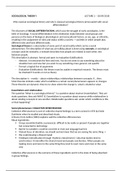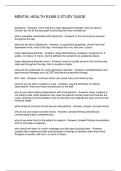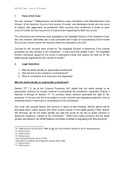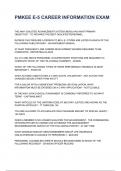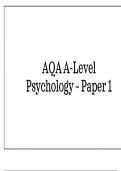Why classical sociological theory and why is classical sociological theory preoccupied with social
differentiation?
The discovery of SOCIAL DIFFERENTIATION, which was the struggle of early sociologists, is the
birth of Sociology. A social differentiation is the distinction made between social groups and
persons on the basis of biological, physiological, and sociocultural factors, as sex, age, or ethnicity,
resulting in the assignment of roles and status within a society -> societies in which people play
different roles and have different tasks.
Sociological theory is a description of some part of social reality which can be a social
phenomenon. The description of what you are talking about is done using concepts. A sociological
concept could be networks; a network describes how people are related to each other; ties
between people.
This description is abstract, formal and open to evaluation (falsification):
- Abstract: it transcends the here and now. You do not want to say something about the
situation here and now but you want to say something more general, not specific
- Formal: a logical line of arguments
- Evaluation (falsification): the theory must be usable in empirical research. The theory must
be checked if it works or not as theory
The description is – mostly – about relationships; relationships between concepts: if… then.
Most theories indicate under which conditions a certain social phenomenon appears or changes.
These theories are dynamic: they try to show where the change is, what is related to what.
Essentialism and relationalism
The question ‘What is a sociological theory?’ is a question about essence (essentialism). They are
static questions; they ask WHAT IS. Essentialism is a question about essence while relationalism is
about relating concepts to one another. Relationalist questions ask: under which conditions is this
or that happening?
Social phenomenon: COLLECTIVE EFFERVESCENCE
Collective effervescence (a sort of collective shared feelings) is a term coined in 1970 by Emile
Durkheim when he studied and described rituals.
A theory from Collins (2004) explains well the collective effervescence.
Ritual ingredients:
Group assembly (bodily co-presence): difficult to be really co-present if people are together
but connected to technology
Barrier to outsiders: could be concrete or even just language barriers
Mutual focus of attention; we should and we know that we are seeing the same thing ->
We could develop a Shared mood
Feedback intensification through rhythmic entrainment (= idea that bodies tend to
synchronize): it intensifies the shared mood and people synchronize. When people are
looking more and more to the same thing they tend to react more and more in the same
way.
Collective effervescence is the outcome of these ingredients and it is the state of being absorbed
in group feelings.
,What does sociological theory do?
Sociological theory is a guide to sociological inquiry and an attempt to bring order to its results. A
guide because it narrows down the results. You try to pinpoint observations and describe them
with concepts.
“Theory is our most developed way of organizing the knowledge we have, but it is never
complete” It is almost impossible to describe something with only one theory.
Theories must be systematic and they must use scientific tools
Theory restricts and sharpens the researcher’s view.
Theory determines which questions are raised in research and consequently, how research
portrays social reality.
Sociologizing sociological theory
The question “What is a theory?” is a philosophical question that can be turned into a sociological
question. When, under what conditions, do sociologists perceive certain statements as ‘theory’?
What are sociologists doing when they do theory?
It turns out that ‘theory’ has many different meanings to sociologists. There are many forms of
theories.
THEORY #1
Most common and standard way of describing what theory is.
A coherent set of propositions (= a statement or assertion that expresses a judgement or opinion)
that are claimed to have universal validity: you have statements about social reality that are
claimed to be true universally.
Theory = a set of interrelated propositions that allow for the systematization of knowledge,
explanation and prediction of social life and the generation of new research hypotheses.
These theories can be used in every age and society.
It is a vary general theory; such as the one from Collins (2004) about collective effervescence/
Collins’ Interaction Ritual theory.
THEORY #2
Denoting generic factors to explain a specific phenomenon. Example: flipping the finger in the
traffic is caused by an emotional transformation in which an embodied narrative brings the body
back to latency (the state of existing but not yet being developed or manifest; concealment) – Jack
Katz (1999).
More of an abstract theory.
You study a specific social reality and you want to pin point how it emerged, how it came to be. In
describing and theorizing how it came to be you use very generic terms.
THEORY #3
Making sense of the contemporary social world. Example: the ‘Risk Society’ (1986) by Ulrich Beck.
1986 -> when Chernobyl happened.
We live in an age where most dangers are created by humans, by technology which also makes
people dependent.
THEORY #4
The study of classic works: Karl Marx, Emile Durkheim, Max Weber. They are generally accepted as
important works and they provide the foundations.
, THEORY #5
Developing a new perspective; a new way at looking at the world. It offers more abstract principles
than theory #3.
Example: Goffman’s work about the dramaturgy of daily life -> describing in a very rich language
the social reality we live in.
THEORY #6
Metatheory (= the investigation and analysis of theories; a theory concerned with the
investigation, analysis, or description of theory itself) is about working on existing theories,
commenting and confronting them.
Example: a lecture
POSITIVISM
Theory #4 is considered problematic. Should theory #4 be part of science?
“A science which hesitates to forget its founders is lost” – Alfred North Whitehead
Knowing the history of the science is important.
Max Weber: “In science each of us knows what he has accomplished will be antiquated in then,
twenty, fifty years”. “Every scientific contribution has to be surpassed and outdated” -> MOVE
FORWARD
Positivism: progress in science
A positivistic approach in science is also influential in Sociology.
Positivism: to move forward; improvement; the quality of having a positive attitude or message. In
social sciences it is the belief that knowledge comes from things that can be experienced with the
senses or proved by logic. Therefore empirical observations are central:
- Scientific debates should revolve around (and be resolved by) empirical observations not
about theoretical assumptions like ‘let the facts speak for themselves’
- So, theory and empirical observations should be separated
The focus is on the progress which is only possible by improving the methods and techniques of
empirical observation and analysis.
Is it possible to know reality directly? No, it is not possible. Facts do not speak for themselves.
Theory is needed for facts to speak. It is impossible to separate theory and empirical observations.
How about objectivity? Scientific objectivity: a set of rules about how reality is observed and
reported.
Why study the classics?
The classics provide a common identity in a fragmented science. Studying the classics to develop
sociological intuition which is needed for doing theory.
Classic Sociologists did not have a basis to study on so they had to “invent” a lot.

